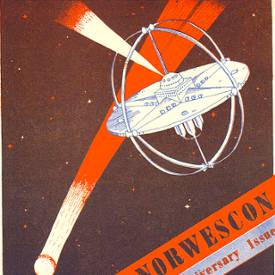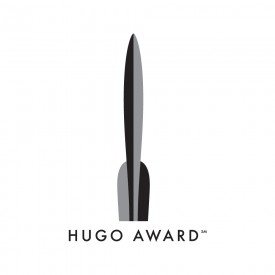In light of the Russian Bear once again flexing its imperialist muscles in these not-quite-as-modern-as-we-thought contemporary times, I thought I’d remind you that Russian/Ukrainian relations are an ongoing story by taking you back nearly a quarter of a century to fannish life in what was then the Soviet Ukraine.
In May of 1990 I was happily ensconced in the beginning stages of my five year run as ‘God-Editor’ of BCSFAzine (I had quite the editorial persona), the newsletter of the B.C. SF Association. Out of the ether a letter arrived from Alexander V. Vasilkovsky of the Soviet Union:
“We, science fiction fans from the Ukraine, the members of Zoryany Shlyah SF Club, would like to establish contacts with your association. Our club was founded last year on the ruins of two former clubs. Its title means ‘Star Trek’ in Ukranian but it is not merely a club of STAR TREK devotees…”
“There are a lot of English-reading fans in our fandom… As far as we know, our club is the first English-language SF fan club in the USSR. Most popular in our fandom are the books by Orson Scott Card, Kim Stanley Robinson, Joe Haldeman and Philip K. Dick. But out tastes are sufficiently distorted by the book deficit. We don’t even have the most known books by the authors I mentioned…”
I promptly wrote back and sent them several SF pocketbooks I thought they’d enjoy. Thus began a regular correspondence (and book exchange) which lasted several years.
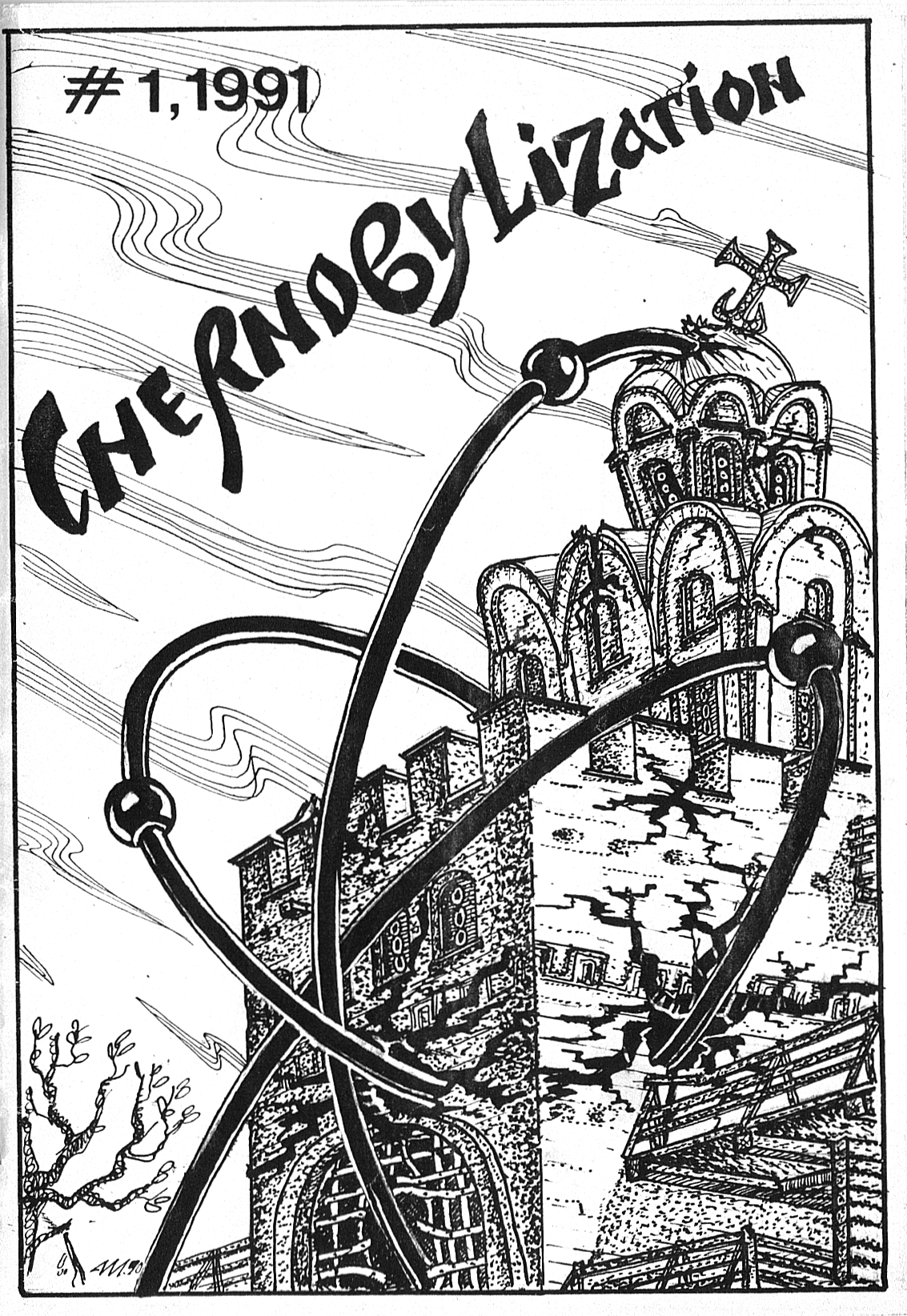
In his first letter Alexander mentioned they were thinking of putting out a newsletter. By February of 1991 he was able to write:
“Our zine’s first issue is almost ready. After the refusal from the Strugatsky brothers to use their title I proposed (it coincided with the title of one of their novels), we are using another one, proposed by Boris Sidyuk. CHERNOBYLIZATION is the title. Isn’t it horrific? I asked him to use something more moderate, but at that time front cover was already made with this cover. So I have to co-edit a fanzine with such an ugly title. But as for me, zine is quite nice inside.”
Boris, it soon became clear, had a somewhat dark (though gleeful) sense of humour, perhaps prompted by the Chernobyl disaster itself as Alexander subsequently commented:
“In 1986 just after the Chernobyl disaster Kiev became a capital of ‘black humour’ in the USSR. It seemed as if a volcano of black humour began to erupt in kiev. The eruption have long ago stopped, but the taste to black humour remains among the Kiev inhabitants. But all humour, not only black, is welcome.”
Hardly surprising, considering how devastating the Chernobyl catastrophe, located in the Ukraine, was to the local population. In CHERNOBYLIZATION #2 written 5 years later, Sergei I. Grabovsky cites some of the effects:
“…of total of 7 thousands have already died of diseases and about 50 thousands have fallen ill…. The ruins of blown-up reactor block were included into the giant sarcophagus… in this 35 tons of radioactive dust are contained… 1500 sq. metres of cracks were detected in the walls of the sarcophagus, and its further destruction threatens with dispersion …”
“…International Atomic Energy Agency head by Dr. Blix recently produced report for United Nations, where it’s alleged that nothing terrible has happened and one can placidly live in the territory contaminated with radionucleids… The Ukrainian ‘Greens’ have invited Dr. Blix to move to Chernobyl—clean, full of fresh air and free of urban crowds (abandoned since 1986). Yet no reply has followed.”
Indeed, sometimes humour is desperately necessary, for life can be grim. As Sergei says of Ukrainian writers:
“Now they have no time for science fiction—life itself is so science fictional…”
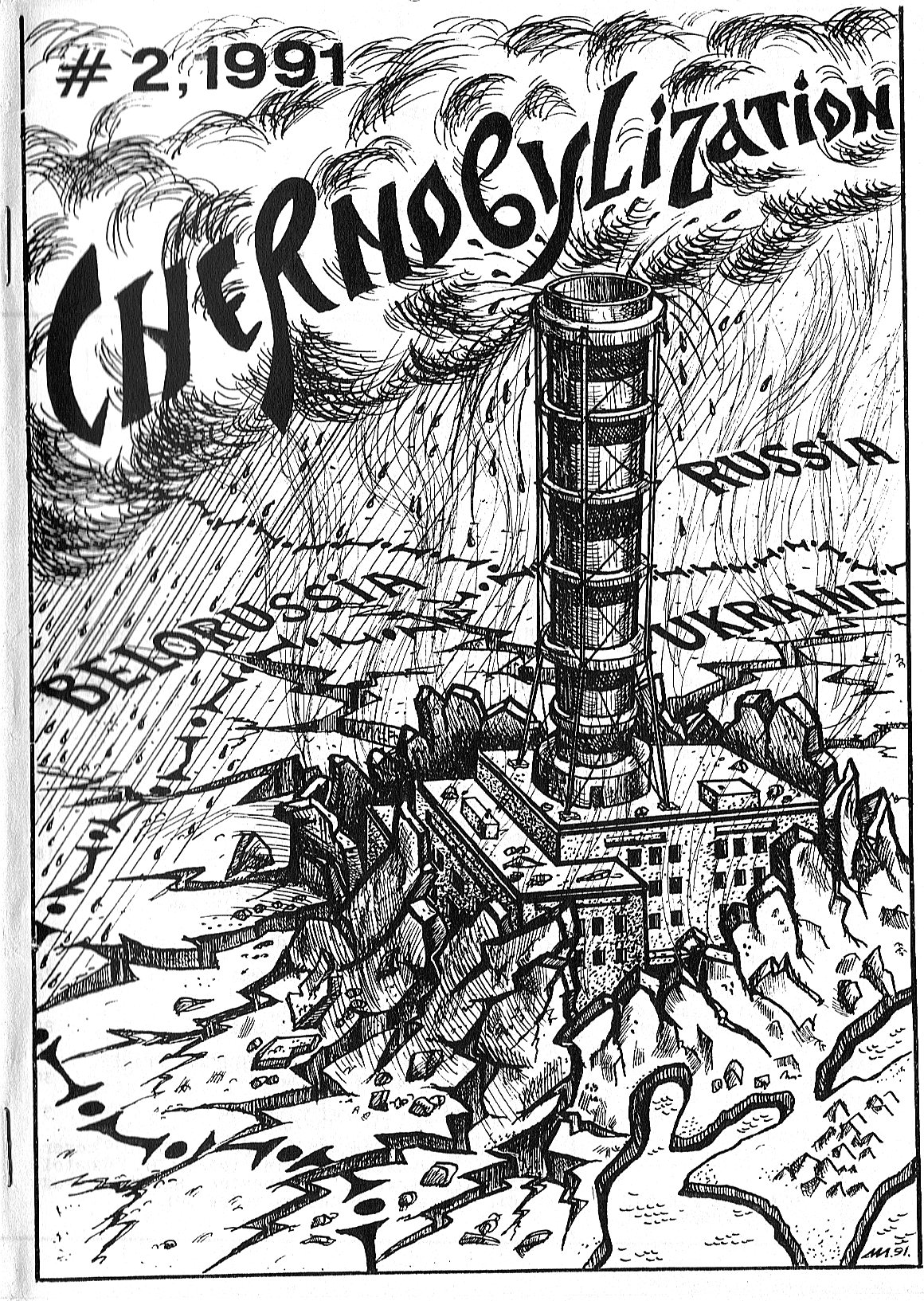
Or at least Kafkaesque, as Boris reveals in an article in CHERNOBYLIZATION #1 about his efforts to win official permission to attend ConFiction Worldcon 90 in Holland.
First he goes to Soviet Ministry of Foreign Affairs in the Ukraine and is directed to the Department of Capitalist Countries. There he hands “The One Sitting There” (who doesn’t bother to identify himself) papers received from Holland. The Soviet bureaucrat reads through the documents.
“Well… so… hmm… so… Yes, all is clear.”
Permission denied. The Department of Capitalist countries only grants visas based on organizational invitations. The papers offered by Boris are clearly personal invitations. Perhaps he could try the Department of Visas and Registration which examines such?
Boris hotfoots over to the second office where the following dialogue takes place:
“Good morning.”
“Good Morning.”
“Here are the invitations.”
“Hmmm… They are worthless ones. Good bye. Who’s next?”
“Why not?”
“”It is not a private invitation. And, in general, invitations can be either from a private person to a private person or from an organization to an organization. Invitations can’t be from an organization to a private person. Do not disturb me. Who’s next?”
The Department of Capitalist Countries (organization only) said the invites were private, so no good.
The Department of Visas and Regulations (private only) said the invites were organizational, so no good.
Kafka would smile.
Months went by. Then all at once the mailbox exploded with both sorts of required invitations, plus an offer from the Dutch Embassy to simplify Dutch Visa procedures, an offer from Royal Dutch Airlines to ‘hold’ tickets till they could be paid for, and even an offer from FANS ACROSS THE WORLD to pay for the Dutch Visas.
Boris returned to the Soviet bureaucrats armed with exactly what was needed. They turned him down flat. Seems he hadn’t applied early enough…
“During the late August a number of ghosts were walking in the Hague. They moved themselves across the corridors of Congress Centre, listened for discussions and talks, watched silently the beautiful action of the great phantasmagoria of Dream. They were our spirits who managed to get to where our bodies couldn’t get.”
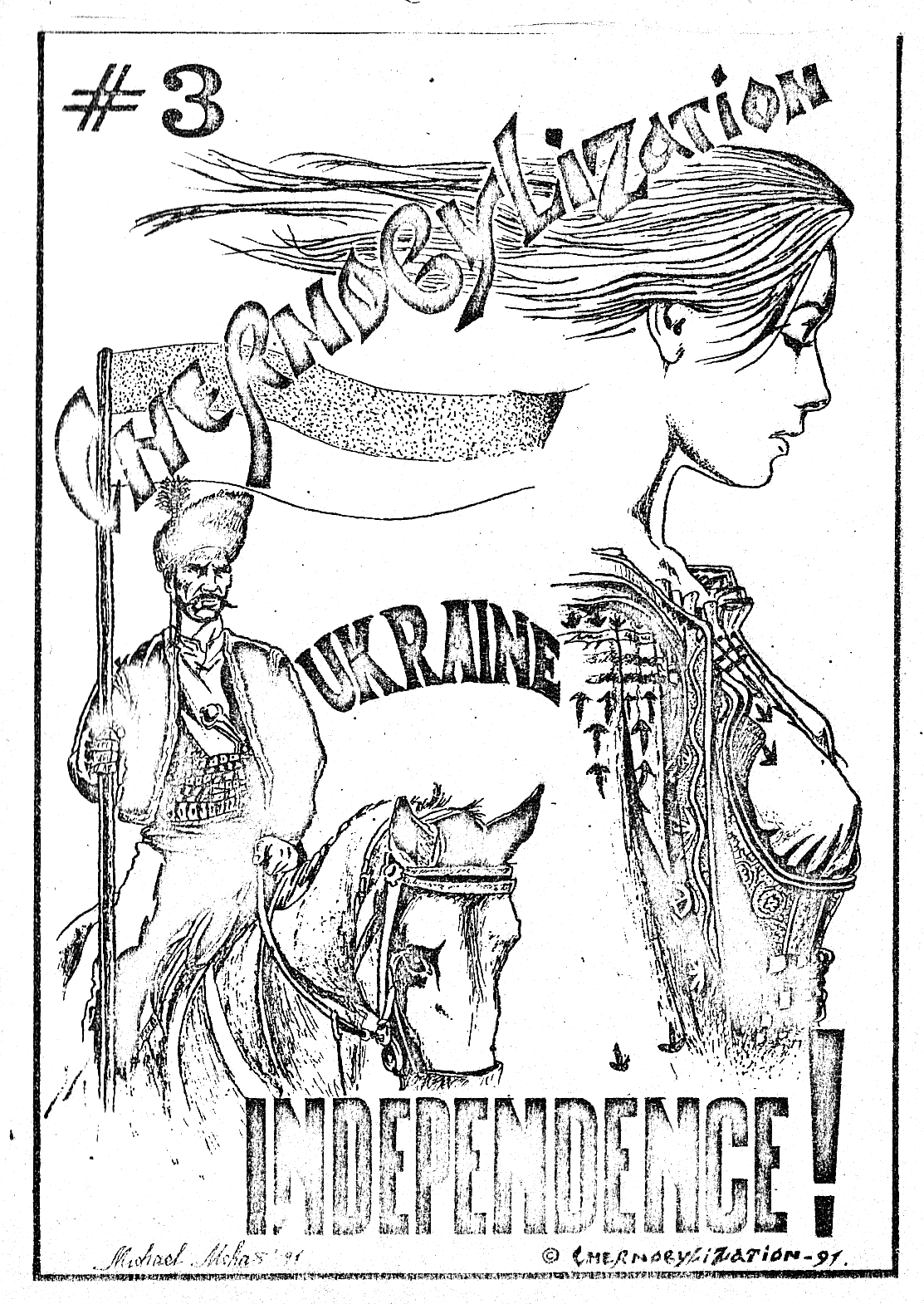
CHERNOBLYIZATION #3 celebrates Ukrainian independence, but it and the fall of Communism in Russia were a near-run thing, what with Soviet hardliners launching a coup August 19-21, 1991. The issue contains a fascinating article titled SCIENCE FICTION ON THE BARRICADES.
First the author explains what Gorbachev’s reforms had meant to SF Fans like him:
“In the 70s and the 80s, during the time of totalitarian leadership of the Communist party, the development of SF&F literature was practically suppressed…”
“It was considered that nobody but the party could see the ways of the construction of everybody’s future and any attempt of reflecting the other ways of achieving this future were totally forbidden. Any literary work about sex problems, global catastrophes and different social problems couldn’t be published. Fantasy was considered bourgeois, occult and clerical by the party censors.”
“But in the time of perestroika all obstacles and barriers were broken. New authors and new literary works talentedly reflecting the previously forbidden topics appeared in print.”
This understanding of SF history was shared by all Soviet fen, including the Ukrainian fen. Come the coup, Moscow fans in particular were deeply worried the days of repression would return, possibly as bad as the purges of the Stalin era. Consequently Moscow SF clubs and magazines burned their archives and membership lists, and took the precaution of erasing files from their computers. Possibly Ukrainian fans did the same.
But as we all remember, the coup ran out of steam and the Soviet Union began its painful transition into Russia minus assorted appendages previously conquered and absorbed. The Ukraine subsequently declared its independence. In a December 8, 1991 letter Alexander is quite content, despite certain problems:
“You know about political changes happened during the recent months. Ukraine is independent again, and we’re all happy about it. (Hence minor but very substantial change in my address).”
Here Alexander is referring to the fact that ‘U.S.S.R.’ no longer appears after ‘Ukraine.’ Not needed anymore.
“Certainly, our life will not become easy and prosperous instantly. There is a lot of work to be done. Ukrainian money (hryvnas) are now printed in Canada by Canadian Banknote Corporation, and they’ll be introduced in May or June of 1992. Hryvnas will stop hyper-inflation caused by incontrollable printing of money by Moscow.”
It is interesting to note that 6 months earlier Alexander had reported:
“There are rumours that hryvnas are already being printed in Canada at Ukrainian diaspora’s expense, but, unfortunately, they’re only rumours.”
Turned out the rumours were true!
Getting back to Russian economic policy:
“Until recently 100-rouble note was the biggest. This year 200, 500 and recently 1000-rouble notes have appeared. In late November the inflation rate was 3.8% per week. In early December Moscow has announced new exchange rate (they buy at US$1 = R90, and sell at US$1 = R99), so last week’s inflation rate was greater. We still have joint financial system with the Union government, so only hryvnas can save us from Moscow’s mad financial policy.”

Speaking of the Ukrainian diaspora, Boris Sidyuk writes:
“I congratulate you on the third Canadian State Language that is Ukrainian.”
A bit tongue-in-cheek that, yet not so far off the mark. If I heard correctly while watching the C.B.C. news, 3 million Canadians are of Ukrainian descent, the result of the so-called ‘Ukrainian diaspora.’ They live mostly in the Prairie Provinces. In fact I once visited the world’s largest Ukrainian Easter Egg which, at least the size of a Volkswagen van (as I remember it), is on display outdoors somewhere in Alberta, I think. But I digress.
Point is, because of the huge number of Ukrainian immigrants and descendants Canada traditionally keeps an eye on Ukrainian affairs. Alexander writes:
“Canada was the first or second nation to recognize Ukrainian independence… Ukrainian media gave full account of the 100th anniversary of the arrival of the first Ukrainians to Canada… Canadian Ukrainians are more and more involved into the economic reforms conducted by Ukrainian government. And there was a lot of Canadian and American supervisors at referendum and presidential elections on December 1, 1990. You know the figure: 90% for independence.”
However Alexander was disappointed in the results of the Presidential election. His preferred choice, Mr. Chornovil, who was also the club’s preferred choice, did not win. Perhaps as a consequence of this Zoryany Shlyah club meetings began to be dominated by political discussion to the detriment of SF considerations. But what the heck. Freedom was in the air. Club members were helping to create the future and no longer merely fantasizing about the future. Science fiction in action!
Trouble is, progress into the future doesn’t always mean progress. Today Crimea has been taken away from the Ukraine. Tomorrow, perhaps most of the Ukraine east of the Denieper River will be swallowed by the Russian bear.
Where will this leave Ukrainian fans?
I suspect more black humour on the way.
Next week I will dwell on the lighter, more whimsical side of contact with the Zoryany Shlyah club.
For example, no doubt you’ve been wondering what the narrow blue and white illustration is?
It is a Ukrainian milk carton, sent to BCSFA from Kiev.
Why a milk carton?
Why not?


